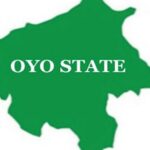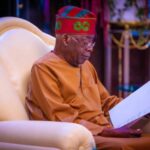By Abbas Jimoh & Idowu Isamotu
The 19 northern governors and all the traditional rulers in the region have called for the amendment of the 1999 Constitution to give legal backing to state police.
They said this was the only way to tackle the myriad security challenges affecting the region and the country at large, among them banditry, insurgency, kidnapping and other forms of criminalities.
Recruitment: Crisis lingers in Police Commission as workers continue protest
DSS, Police, my aides were shot dead, Sen. Ubah confirms attack on convoy
This recommendation was contained in the communiqué issued at the end of the meeting of the Northern Governors Forum (NGF) and the Northern Traditional Rulers Council (NTRC) held Monday night in Abuja.
The outcome of the meeting was released yesterday and it was the first time the northern governors, sitting together with traditional leaders in the region, made a strong case for the need to allow states to establish police forces.
Governors and other political leaders from the South, and a few others from the North were more vocal in advocating for state police, a move dismissed in some quarters on the grounds that when established, those paying the bills to maintain the state police would abuse it by deploying the security outfit against those opposing them.
What the northern leaders said
Monday’s meeting by the northern leaders was held to among other issues “Review the state of security in the North and other matters relating to its progress and the development of the region.”
At the meeting were chairman of NGF and Plateau State governor, Simon Bako Lalong; Gombe State governor, Muhammadu Inuwa Yahaya; Katsina State governor, Aminu Bello Masari; Kaduna State governor, Nasir El-Rufai; Kebbi State governor, Abubakar Atiku Bagudu; Borno State governor, Babagana Umara Zulum; Niger State governor, Abubakar Sani Bello; Taraba State governor, Darius Dickson Ishaku; and deputy governors of Adamawa, Benue, Nasarawa and Jigawa states respectively.
Traditional rulers present included the Sultan of Sokoto, Alhaji Muhammad Sa’ad Abubakar III; Shehu of Borno, Alhaji Abubakar Ibn Umar Garbai El-Kanemi; Emir of Kano, Alhaji Aminu Ado Bayero; Emir of Zazzau, Ambassador Ahmed Nuhu Bamalli; Emir of Fika, Alhaji Muhammadu Abali Ibn Muhammadu Idrissa; Emir of Lafia, Justice Sidi Bage Muhammad; Emir of Anka, Alhaji Attahiru Muhammad Ahmad, Emir of Gumi, Justice Lawal Hassan Gumi; Attah Igala, Mathew Opaluwa; Ochi’Idoma, Pastor John Elaigwu; and Aku Uka of Wukari, Elder Manu Ishaku Adda Ali, among others.
Reading the communiqué after the meeting held at the Transcorp Hilton Abuja, NGF Chairman, Lalong said the meeting reviewed the security situation in the North and other matters relating to its development and resolved to support the amendment of the 1999 Constitution to accommodate the establishment of state police.
According to him, “This will effectively and efficiently address the security challenges of the region,” the communiqué said.
Agitations for decentralising the Nigerian Police Force have remained a subject of discourse with those in its favour saying it has become practically impossible to police a country the size of Nigeria from Abuja, the Federal Capital Territory.
Considering that the decentralisation would require an amendment of the constitution, the security situation had led to the formation of many states, regional and local security networks by state governors, local government chairmen and groups.
Daily Trust reports that one of the resolutions of the 2014 National Confab was a restructured Nigeria with state police to strengthen security in the country.
Renewable energy key to northern development
During the meeting yesterday, the governors and traditional rulers also reiterated their commitment to the development of solar energy in view of the comparative advantage of abundant sunshine in the region.
They, therefore unanimously resolved that 2,000 megawatts of solar power be harvested across the 19 states and FCT with a view to harnessing the huge potential of power from solar.
The meeting also regretted the ongoing strike by the Academic Staff Union of Universities (ASUU), which it believes was more punitive in the region as most of the students in the North are attending public universities.
“It, therefore, called on ASUU to cooperate with the federal government in resolving the dispute,” the communiqué added.
Set to address girl-child education
The northern governors also engaged officials of the World Bank to discuss the level of implementation of the Adolescent Girls Initiative for Learning and Empowerment (AGILE) and Nigeria for Women Project, which are being implemented in five northern states.
The leaders also discussed security issues, women’s development, agriculture, trade and investment and the role of traditional rulers in engendering peace and security in the northern region.
During the meeting, there were presentations by development partners, including Nigeria for Women Project (NFWP) and Adolescent Girls Initiative for Learning and Empowerment (AGILE) both funded by the World Bank.
The governors also received updates on the Northern Nigeria Renewable Energy Project (NNREP), Nigeria Livestock Transformation Plan (NLTP), Livestock Productivity and Resilience Support Project (L- PRES) and Kaduna Textile Limited (KTL) among others.
There have been calls for the establishment of state or community policing, which some argued is the panacea that would drastically end insecurity challenges, especially in local communities.
Ex-AIG to Govs: Focus on root causes of insecurity, state police already in existence
In an interview with one of our correspondents last night, a retired Assistant Inspector-General of Police, Austin Iwar, said that the state-controlled security outfits already exist in about 25 states in the country.
Iwar, however, charged the northern governors as well as their southern counterparts to forget about the issue of state police and address current socio-economic and political challenges facing the country.
The former senior police officer specifically said in states where people were not employed, where teachers and other workers were not paid, and where kids were out of school for months because of strikes, people will delve into crime.
He said, “First of all, honestly, it is difficult for me to understand what these people mean by state police or when they talk about state police because we are already using the state police, even though it is illegal.
“In almost every state, in fact, in 25 or 26 states, there are state-controlled security outfits, whether it is called vigilante, neighbourhood safety or watch, Amotekun, Ebubeagu, Hisbah or whatever it is being called; it is a state-controlled security outfit that has all powers of the police.
“They have powers to arrest, the powers to investigate, the powers to prosecute, the powers to charge people to courts, powers to go on patrols, powers to wear uniforms with signals. They have every power the police have.
“Some of the security outfits are carrying guns. Amotekun carries guns. So, when they talk about state police, I begin to wonder what again they want, because they have already illegally created state police. So, what else do they want?” he asked.
“People are not looking at the root cause of the insecurity in the country. It seems to me that people think the problem of insecurity just emerged like that, they did not look at the historical context of the emergence of insecurity – the problem that has to do with the economy, lack of jobs,” he added.

 Join Daily Trust WhatsApp Community For Quick Access To News and Happenings Around You.
Join Daily Trust WhatsApp Community For Quick Access To News and Happenings Around You.


